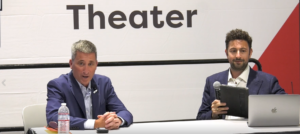- Sponsored Content
- Gene Therapies
BioProcess Insider Interview: Tom VanCott, Catalent
August 24, 2022
Sponsored by Catalent

Tom VanCott, PhD, Global Head of Product Development, Catalent; and Dan Stanton, Co-founder and Editor, BioProcess Insider.
Moderator: Dan Stanton, Co-founder and Editor, BioProcess Insider.
Featuring: Tom VanCott, PhD, Global Head of Product Development, Catalent.
Contract development and manufacturing organization (CDMO) Catalent has expanded significantly over the past decade through strategic acquisitions and investments in cell and gene therapy (CGT) capabilities. VanCott reflected on how his company has supported such growth while manufacturing SARS-CoV-2 vaccines and therapeutics. Catalent was able to accommodate the sudden and extraordinary demand for COVID-19 products because it already had been increasing capacity and capabilities and could reallocate resources to vaccine manufacturing.
Despite such shifts, Catalent continued broadening CGT capabilities acquired by its prepandemic purchases of MaSTherCell and Paragon Bioservices. VanCott noted several difficulties associated with viral-vectored gene therapies, including long lead times for good manufacturing practice (GMP)-grade plasmids and viral vectors. Catalent has integrated Paragon, MaSTherCell, and other CGT manufacturers to address such bottlenecks and provide end-to-end services for multiple types of advanced therapies. Broad capabilities are critical for addressing drug developers’ needs.
Now, Catalent is focusing on standardizing and simplifying processes. VanCott explained that focusing on a few critical parameters relating to bioreactor titers and product quality will help to accelerate process and analytical development, as will using a proprietary cell line, internally produced reference materials, and templates for batch records. The AAV process takes nine months from receipt of gene to production of clinical trial material, while balancing yield, quality, and speed.
Catalent expects to continue adding capabilities. In 2021, it acquired a manufacturer of induced pluripotent stem cells, a move that will help the company to generate high-quality starting materials for allogeneic cell therapies. VanCott said that the CDMO industry is likely to move further into development of allogeneic therapies and mRNA-based therapeutics.
Fill out the form below to view the full BPI Theater webcast.
You May Also Like





